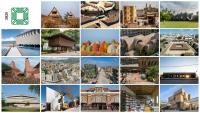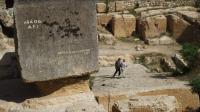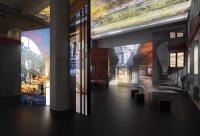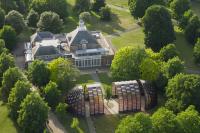Energy Carousel Dordrecht
Dordrecht, Netherlands
The Centre for Visual Arts in Dordrecht In cooperation with the Amsterdam design bureau Carve invited 10 European design firms to develop inventive, resourceful and multi-age friendly playful objects to complete the design for the new public space, the Governeursplein square in the city of Dordrecht. Ecosistema Urbano’s “energy carousel” was one of the winning proposals chosen to be implemented.
Dordrecht Energy Carousel - exploring playground potential
A chandelier of hanging ropes....
... a shelter...
… an iconic meeting place for different age groups...
... that swivels...
... and produces energy....
... to turn into colored light in the evenings...
As a forest of revolving rope swings that hang at different lengths, the hanging rope seats towards the center of the structure accommodate smaller, younger children, while taller, older children may grab onto the shorter ropes on the outside. The kinetic energy that is released by the children’s hanging and turning on the ropes is captured via carousel structure and stored in a battery underneath the play site.
When the park begins to lose light, the carousel’s battery supplies energy to light up the structure. When the speed of play increases, the lamps will light up brighter. The color of the lights also changes according to how much energy has been generated by the children on any particular day.
Ecosistema Urbano has designed this play structure with two particular focuses in mind. The first is to promote education through play, teaching children about alternative methods for generating electrical power with their own physical experience. Second, was to use efficient materials that also serve to highlight the project’s unique design. The LED lights use a minimal amount of energy. The structure, unlike most play structures, uses a limited amount of steel – Its body is instead a tensegrity structure formed with cables and steel rings. The textile roof fabric protects children against rain and bright sunlight, and boasts a swirl pattern to accent the movement-to-energy potential of the structure.
We believe that through projects that emphasize the ecological pedagogy, we can send to the next generation of citizens a subtle message about the potential for creative and a more sustainable approach to urban design.
- Architects
- Ecosistema Urbano Arquitectos
- Any
- 2012
- Client
- Municipality of Dordrecht













